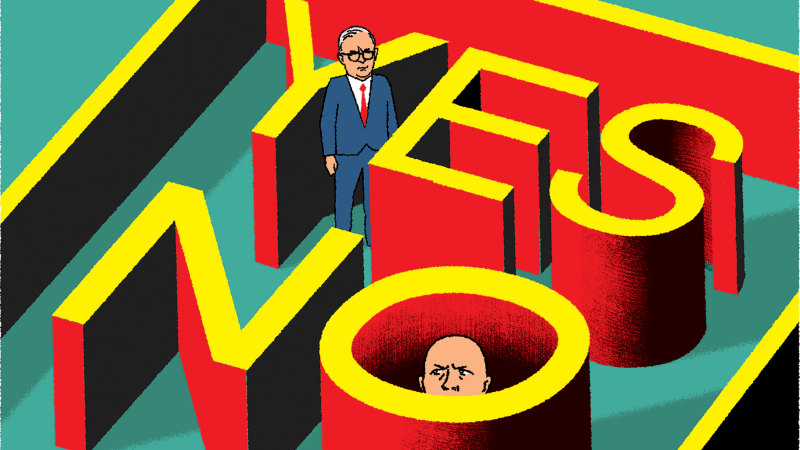Save articles for later
Add articles to your saved list and come back to them any time.
The Voice debate has ignored the actual words of the proposed addition to the Constitution. Those words will not lead to a torrent of legal cases, nor will they introduce social divisiveness in our foundation document.
The proposed addition commences: “There shall be a body to be called…” the Voice. Some decry them as words of compulsion, but almost exactly the same words are already in the Constitution.
The referendum question is no more “divisive” than what we have already created, to the benefit of the whole nation.Credit: Eddie Jim
Section 101, which has been in the Constitution since the beginning, states: “There shall be an Inter-State Commission”. The section says the commission would have “such powers … as the Parliament deems necessary … relating to trade and commerce …”
Similarly, the Voice proposal states that the parliament can make laws about the “composition, functions, powers and procedures” of the Voice.
The Inter-State Commission existed for two years early in the federation. Then the High Court declared the legislation invalid because it infringed the exclusive judicial power of the courts.
The proposal for the Voice was drafted with an eye on that history. The powers that parliament can confer on the Voice and its structure are expressly made “subject to the Constitution”. That addition is not necessary for protection of the judicial power, which the High Court has already decided. However, it makes it clear that the Voice amendment does not impinge on the role of the parliament.
Gough Whitlam found the failure to obey the Constitution’s words “there shall be” offensive. He also wanted to expand Commonwealth authority. There is a power in the Constitution for the Commonwealth to prevent a state discriminating against other states about railways, but only on the advice of the Inter-State Commission. His government resurrected the commission. That lasted only a few years. Despite the words “there shall be”, it hasn’t existed for over a century since the Constitution came into force.
Nothing about how the Voice operates is set in stone by the words of the amendment. Should a future parliament repeal the legislation, it cannot be forced to create a new Voice. The words “there shall be” are not words of compulsion enforceable on the parliament in our constitutional tradition.
I find it difficult to envisage successful litigation based on this constitutional change. I don’t underestimate the capacity of our lawyers for creative submissions. Most of the time, they are rejected by the courts.
If there is litigation arising from the Voice it is most likely to be about the act of parliament which the new section authorises. This frequently happens for Commonwealth legislation. It happened to the Inter-State Commission. The parliament can always change legislation.
As a former judge, I find it offensive that some participants in this debate cast doubts on the integrity of our judiciary when predicting what might happen if this addition is made. What is most offensive about this is the fact that they call themselves “conservatives”.
The proposed amendment gives the parliament a wide discretion on how the Voice is structured. The proposal by Peter Dutton to create a regionally focused Voice can be achieved by amending the legislation which the Albanese government enacts. He does not need another referendum. If elected, he can use this one.
The second significant word in the Voice amendment is the reference to Aboriginal and Torres Strait Island Peoples. That was the word used when the discussion on constitutional recognition began. “Peoples” is also the word used in the United Nations resolution that has guided similar debates throughout the world.
Along the way in Australia, some participants in the debate changed “peoples” to “nations”. The change reflects the more controversial language of “sovereignty” and “treaty”, which some use to scare voters about the Voice. As the Uluru Statement recognises, these are issues to be considered later, together with truth telling.
The choice of the word “peoples” makes it clear that the Voice amendment has nothing to do with those issues, whatever the appendices to the Uluru Statement may say. That is the main reason why some Indigenous representatives say, this is not good enough and advocate a no vote, without giving any reasons why it is not good, or even worse. As Voltaire put it: “The perfect is the enemy of the good.”
The prime minister has correctly emphasised that this is an advisory body. Divisiveness is not created by such a body.
The special status of our First Peoples has long been recognised in many ways, such as with former prime minister Kevin Rudd’s apology to the stolen generations, which was also decried at the time as not good enough. That special status is manifest most clearly in the recognition of land rights as part of our common law by the High Court in the 1992 Mabo judgment – a decision reinforced by acts of all our parliaments.
The referendum question is no more “divisive” than what we have already created, to the benefit of the whole nation. Many opponents of the Voice may not have shared that view about recognition of land rights or the apology. But they do not advocate repealing the land rights legislation or withdrawing the apology, two developments which, by accepting that Indigenous Australian are entitled to special treatment as First Peoples, have already reduced divisions in our nation.
Kevin Rudd’s 2008 apology to the stolen generations, which accepted that Indigenous Australian are entitled to special treatment as First Peoples, reduced divisions in our nation.Credit: Andrew Taylor
Our Constitution may be the only one in the world to confer an express power to make legislation on the basis of race. Divisiveness was with us from the start. The 1967 referendum that enabled the Commonwealth to make laws for Indigenous Australians under the race power reduced divisiveness in our nation. It enabled the Commonwealth to override the long history of discrimination by state legislatures and governments. I witnessed that personally as a student on the 1965 Freedom Ride through NSW.
However, the race power can still be used for its original racist purpose. As a barrister, I appeared as the QC for the Indigenous women in the Hindmarsh Island Bridge case, better known as the “secret women’s business” case. I could not convince the High Court that the 1967 referendum had changed the original meaning of the race power, so it could not now be used to pass discriminatory legislation.
The Voice will operate as a brake on any future Commonwealth government attempting to do that. It is a further step to reduce the divisiveness in our constitutional structure.
James Spigelman KC served as Chief Justice and Lieutenant-Governor of NSW from 1998 to 2011.
The Opinion newsletter is a weekly wrap of views that will challenge, champion and inform your own. Sign up here.
Most Viewed in Politics
From our partners
Source: Read Full Article



